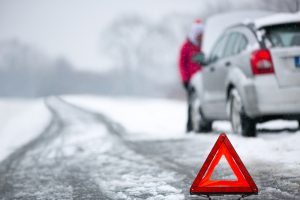 Winter presents a unique set of challenges for drivers and their vehicles. The combination of freezing temperatures, icy roads, and snowfall can lead to various problems that can affect your vehicle’s performance and safety. In this blog post, we’ll explore the top five most common vehicle problems that arise during winter and provide tips on how to prevent or address them.
Winter presents a unique set of challenges for drivers and their vehicles. The combination of freezing temperatures, icy roads, and snowfall can lead to various problems that can affect your vehicle’s performance and safety. In this blog post, we’ll explore the top five most common vehicle problems that arise during winter and provide tips on how to prevent or address them.
Dead or Weak Batteries
One of the most common vehicle problems during winter is dead or weak batteries. Cold weather can significantly reduce a battery’s efficiency, making it difficult for the engine to start. In some cases, extreme cold can cause the battery to fail completely.
Prevention and Solutions:
- Before winter sets in, have your battery tested to ensure it’s in good condition.
- If your battery is old or showing signs of weakness, consider replacing it before it fails in the cold.
- Keep jumper cables or a portable jump-start kit in your vehicle in case you or someone else needs a jumpstart.
- Consider using a battery heater or maintainer to keep the battery warm and charged when the vehicle is not in use.
Tire Problems
Tires are your vehicle’s point of contact with the road, and they play a crucial role in winter driving. Common tire problems during winter include inadequate tread depth, improper tire pressure, and damage from icy roads.
Prevention and Solutions:
- Install winter tires with deep treads designed for cold and snowy conditions. Winter tires provide better traction and control on slippery surfaces.
- Regularly check your tire pressure, as it tends to drop in cold weather. Keep the pressure at the recommended levels specified in your vehicle’s manual.
- Inspect your tires for visible damage, such as punctures or cracks, and replace damaged tires promptly.
Frozen Fuel Lines
Winter’s frigid temperatures can lead to moisture accumulation in your vehicle’s fuel system, which can freeze and block fuel lines. When fuel lines freeze, it prevents fuel from reaching the engine, leading to a vehicle that won’t start.
Prevention and Solutions:
- Keep your gas tank at least half full during the winter to minimize moisture buildup.
- Add fuel line antifreeze to your gas tank to prevent fuel lines from freezing.
- If you suspect frozen fuel lines, you can use a space heater or a heated garage to thaw them. Never use an open flame to attempt this.
Engine Performance Issues
Cold air can affect engine performance by causing various issues, such as reduced efficiency and power output. In freezing temperatures, engine components contract, making it challenging for the engine to operate at its best.
Prevention and Solutions:
- Ensure your vehicle’s coolant (antifreeze) is at the correct concentration for winter to prevent the engine from freezing.
- Replace your vehicle’s thermostat if it’s old or malfunctioning.
- Regularly change the oil and maintain the engine to keep it running smoothly in cold weather.
Stuck or Sliding on Icy Roads
Icy roads are a significant hazard during winter, and many drivers find themselves stuck in snowbanks or sliding off the road. These situations can lead to accidents and vehicle damage.
Prevention and Solutions:
- Equip your vehicle with snow chains or studded snow tires to improve traction on icy roads.
- Carry sand, kitty litter, or traction mats in your vehicle to provide additional traction if you get stuck.
- Drive at reduced speeds and increase your following distance to reduce the risk of accidents on icy roads.
Additional Tips for Winter Vehicle Maintenance
In addition to the top five common vehicle problems during winter, consider these additional tips for winter vehicle maintenance:
Keep an Emergency Kit: Prepare an emergency kit for your vehicle that includes items like a blanket, flashlight, extra clothing, non-perishable food, and a first-aid kit. In case you get stranded, these supplies can be invaluable.
Regularly Check Fluids: Monitor your vehicle’s fluids, including oil, coolant, and windshield washer fluid. Replace or top them up as needed to ensure your vehicle runs smoothly in winter conditions.
Winter Windshield Wipers: Install winter windshield wipers designed to handle snow and ice. Keep your windshield washer fluid reservoir filled with winter-grade washer fluid to prevent freezing.
Check Lights: Ensure all your vehicle’s lights are functioning correctly. In winter, when daylight hours are shorter, having working headlights, taillights, and turn signals is crucial for safety.
Plan for Regular Maintenance: Don’t skip regular vehicle maintenance, such as oil changes and tune-ups. Staying on top of maintenance ensures that your vehicle is ready to face the challenges of winter.
Winter presents unique challenges for both drivers and their vehicles. The top five most common vehicle problems during winter, including dead or weak batteries, tire issues, frozen fuel lines, engine performance problems, and problems on icy roads, can be addressed with proper prevention and maintenance. Regular vehicle check-ups, the use of winter tires, and prudent driving practices are essential for safe and smooth winter driving. By preparing your vehicle and staying informed, you can minimize the risk of encountering these issues and ensure a safer and more enjoyable winter driving experience.
And if you want to make sure your vehicle is ready for the cold winter months, schedule an appointment today with the experts at A2Z Complete Car Care!
